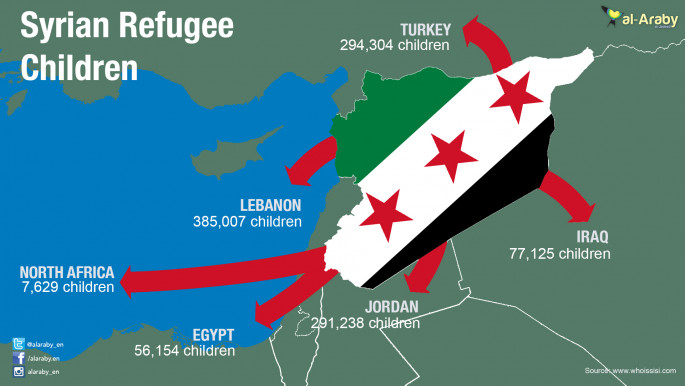UN fears mass exodus from Syrian city of Aleppo
Officials are calling on Turkish authorities to open the border to help those fleeing the violence.
The UN humanitarian office OCHA says 300,000 people could be cut off from aid if the Syrian government and allied forces encircle Aleppo and deprive those attempting to flee of their last way out.
Laying out contingency plans, OCHA said local leaders believe up to 150,000 people could try to flee to nearby Afrin and the surrounding countryside.
The refugee agency UNHCR also called on Turkey to open its borders to allow entry to people who have already fled Aleppo and who have gathered by the thousands near the Syrian-Turkish border.
Turkey's President Recip Tayyip Erdogan was quoted at the weekend as saying: "If needed, we will let those brothers in."
Turkish aid groups have also been setting up relief tents in Syria, and truckloads of aid and ambulances have begun crossing the border.
Car bomb
The UN's appeal came shortly before a car bomb exploded near a police officers' club in the Syrian capital of Damascus, wounding at least eight people.
The SANA news agency said the blast went off near a vegetable market in the northern neighbourhood of Masaken Barzeh.
On Monday, an international rights group said Syrian government forces and the Russian military had been carrying out daily cluster bomb attacks over the past two weeks in Syria, killing 37 people.
The Human Rights Watch report said that cluster munitions, which are internationally banned, have been used in at least 14 attacks across five provinces since January 26.
 |
Syrian government forces and the Russian military have been carrying out daily cluster bomb attacks over the past two weeks in Syria, killing 37 people |  |
Turkey fears influx
Meanwhile, the Turkish government fears that fierce fighting in Syria's Aleppo province will spark the arrival of up to 600,000 refugees at its border in a "worst case scenario".
The clashes in the north of Aleppo province - sparked by a week-long government assault with Russian air support - have displaced tens of thousands of people.
"The worst-case scenario that could happen in this region in the short term would be a new influx of 600,000 refugees at the Turkish frontier," said Deputy Prime Minister Numan Kurtulmus.
 |
| [Click to enlarge] |
Prime Minister Ahmet Davutoglu said earlier on Monday that some 30,000 people were already massed at the Turkish border.
Huge crowds of refugees, mainly women and children, have been forced to wait at the Oncupinar border crossing, which remains closed with only medical emergencies allowed through.
"Our objective for now is to keep this wave of migrants on the other side of Turkey's borders as much as is possible, and to provide them with the necessary services there," Kurtulmus said.
The Turkish government has insisted for several days that its open-door policy to refugees fleeing the Syrian war remains unchanged and that it is ready, if necessary, to accommodate a new wave of arrivals.
"Obviously, as always, we will provide for our Syrian brothers and accept them when necessary," Prime Minister Ahmet Davutoglu told a joint press conference with German Chancellor Angela Merkel.
But he added that his country, which is already hosting some 2.7 million Syrian refugees, should not be expected "to shoulder the refugee issue alone".
 |
Obviously, as always, we will provide for our Syrian brothers and accept them when necessary - Turkish Prime Minister Ahmet Davutoglu |
 |
Refugee camps 'full'
Although Turkey says it will continue to take in refugees, despite reaching the end of its "capacity to absorb", aid workers and the United Nations have warned that camps for the displaced along Syria's border with Turkey are at full capacity.
In and around the border town of Azaz, families are sleeping in the streets, or up to 20 people to a tent, having left their homes with nothing but the clothes they were wearing.
"There are no longer enough places for families to sleep," said Ahmad al-Mohammad, a field worker with Doctors Without Borders (MSF) who enters Aleppo province from Turkey daily.
"Many of them in the first days were sleeping in the streets and outdoors without blankets or covers," he said, adding that up to 20 people were crowding into tents being distributed by aid groups usually meant for seven only.
"Most of the families left with just the clothes they were in," he said, adding that the cold and the crowded conditions were causing health problems including diarrhoea.
 |
There are no longer enough places for families to sleep... Many of them in the first days were sleeping in the streets and outdoors without blankets or covers - Ahmad al-Mohammad, MSF |
 |
He said aid groups were also distributing warm clothes and mattresses, with Turkey allowing humanitarian goods across the border, which remains closed to the fleeing Syrians.
The UN's aid chief Stephen O'Brien said he was "gravely concerned" by the mass displacement, noting that about 80 percent of the tens of thousands of people on the move were believed to be women and children.
"We have reports that civilians have been killed and injured, and that civilian infrastructure, including at least two hospitals, has been hit," he said in a statement.
"People urgently require shelter, food and basic household items."
He called on all parties to end targeting civilian infrastructure and allow civilians to move to safer areas.


